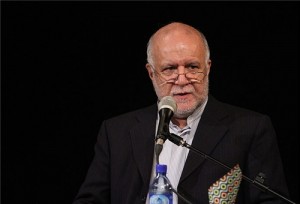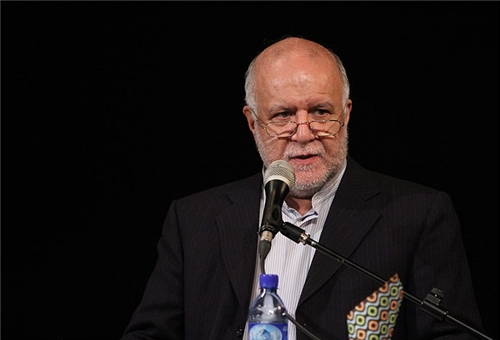 TEHRAN (FNA)- Iranian Oil Minister Bijan Namdar Zanganeh dismissed as baseless the rumors that he has threatened to step down.
TEHRAN (FNA)- Iranian Oil Minister Bijan Namdar Zanganeh dismissed as baseless the rumors that he has threatened to step down.�Unfortunately, spreading this story is only aimed at waging a psychological war and weakening the position of the Oil Ministry. I�m not someone who will resign,� Zanganeh said according to the oil ministry's website, Shana.
�The objective behind spreading this story was to claim that this ministry is not in a stable position, but I will stay in my post at the Oil Ministry as long as God is willing, and I�m not going to resign. I know those who have spread these stories and they should stop writing such things,� he added.
Elsewhere, Zanganeh said the election of Iran as the new secretary-general of the Gas Exporting Countries Forum (GECF) will provide a good chance for the Islamic Republic to show its capabilities and interact with different bodies in the world.
In its 15th ministerial meeting in Tehran on November 3, the GECF elected Iran�s candidate Mohammad-Hossein Adeli as the next GECF secretary-general for a two-year term.
�Although widespread efforts have been undertaken for undermining Iran in the energy market, the world cannot ignore Iran because of its position as the largest holder of oil and gas reserves,� Zanganeh said.
�Many countries are waiting for sanctions to be eased so that they can continue their activities in Iran and the world needs the energy produced in Iran,� he added.
�Given the many capacities in Iran�s energy sector, it is possible to make investments in billions of dollars [worth] of projects to development this sector. Moreover, world countries need energy security supply from Iran,� he said.
He expressed hope that all problems of the country would be resolved with moderation and prudence. �The Oil Ministry has already voiced its readiness to Iran�s diplomatic apparatus to use the levers the petroleum industry wields to lead the country out of crisis.�
Zanganeh said gas is currently making a 64-percent share in Iran�s energy mix, adding that the share is forecasted to reach 70 percent in two years.
�Based on analyses made several years ago, gas could not replace oil, but as gas is being used in other sectors, the share of this clean source of energy in the energy mix will gradually rise,� he added.
Zanganeh said the development of gas industry is first destined for domestic consumption and second for attracting capitals and technology and exports.
�Currently in the Persian Gulf region, except for Iran and Qatar, other countries have no surplus gas for exports and they face many shortages in their gas supply. These conditions offer a good market for Iran�s gas,� the minister said.
�The Indian Subcontinent, Turkey and Europe are good markets for pipeline gas exports from Iran and the next step will be exporting cargoes of LNG for countries located farther,� said Zanganeh.
He said the market conditions determine how gas will be exported. �The geographical position of consumer markets and the level of demand will decide about how gas will be exported. To that effect, gas exports to countries located 1,000 to 1,500 kilometers away from Iran�s border will be done through pipeline, but for gas exports to other countries like Japan, China, South Korea and parts of Europe, LNG cargoes must be shipped,� he said.
�We plan to focus on gas exports through pipeline and ship LNG to countries located farther. Unfortunately, an LNG project which was supposed to come on-stream in the past years is in impasse now,� Zanganeh said.
Regarding Iran�s plans for LNG exports in rivalry with Qatar, the minister said: �A basic difference between Iran and Qatar for LNG cargo exports pertains to geographical conditions and position of the two countries. Due to its small population size and low fuel consumption in Qatar, this country has no domestic market for energy consumption. In the meantime, due to its geographical position, Qatar has no option but to export gas in the form of LNG.�
�But in Iran, due to big population size and its access to neighbors in the region, faces many opportunities for gas exports. Currently, gas exports to Turkey are under way and we can reach the European market through this route. We also plan to export gas to Iraq, UAE and Oman,� said Zanganeh.
�In case the problems related to gas exports to Pakistan are resolved, gas exports to this country will be done. Meanwhile, gas exports to India will pay off due to the economic conditions of this country,� he said.
Regarding gas exports to Pakistan, Zanganeh said, �We have not said that we will not export gas to this country, but I noted that I have no hope of exporting gas to Pakistan because under the contract we invested billions of dollars for the construction of the 56-inch-(diameter) pipeline with the capacity of 100 mcm/d of gas and built the pipeline as far as Pakistan�s border, but no smallest gesture was taken by the Pakistani side to construct the [extension of the] pipeline.�
Zanganeh said five options have been discussed for gas exports to Oman. �Throughout talks recently held with this country, five options were discussed for gas transmission and finally the best route was chosen. It was agreed that the documents be prepared for putting to tender for the construction of subsea pipeline,� he said.
Zanganeh said an Iranian company has been chosen to draft tender documents for the offshore pipeline extending from Iran to Oman. He said a company will be picked to build the pipeline.
He expressed hope that Iran�s gas exports deal with Oman would be finalized in five months.
Zanganeh said gas exports to Turkey are under way, noting that pipeline gas exports are always subject to price discussions.
He downplayed differences over prices, saying, �These are part of exports negotiations and we have such issues with Turkey. They always believe that the gas they purchase from Iran is costly, but we have said that we are selling gas to this country at good price.�
He described Turkey as a good buyer of Iran�s gas. �At present, gas exports are underway to this country and they are paying to the Iranian party. Gas exports to Turkey are continuing.�
Zanganeh referred to shale gas and shale oil development in the world markets, saying, �Oil and gas production from shales is a new category which has entered the market. In this method, oil and gas trapped in shales are extracted with difficulty and at high costs.�
Zanganeh said high crude prices will represent both an opportunity and a threat to countries. �As oil prices climb, many projects whose implementation used to be uneconomical become economical. In the end, oil and gas supply surpasses demand and prices fall. Under such circumstances, if OPEC intends to keep oil prices high it has to reduce its supply on the market and this issue will lower OPEC�s share of the market.�
�Over the past 50 years, OPEC�s share in the market has declined and this important issue reduces OPEC�s influence in decision-making about oil markets. It poses a threat. On the contrary, when oil prices rise, the countries� revenues increase too and it will bring about economic blossoming and help provide more services to people,� Zanganeh said.
He said there has always been a conflict between OPEC and the organizations willing to control oil prices.
�The managers viewing the oil market on the long-term believe that they can keep their quota, influence and power at a high level and therefore maintain their revenues in the market, but other parties only pay attention to their own revenues in the market,� he added.
Zanganeh said, �We don�t have to worry about the oil prices in the market in the coming years, because the United States will try its best to keep the oil prices high in a bid to make shale oil and gas production economical. In case the oil prices decline, all their investments will face problems.�
�On the other hand, the US is trying to reduce its dependence on the Middle East for its energy needs and by investing in this sector create the necessary economic blossoming in its own region,� he said.
�With gas production from unconventional sources, demand for conventional gas [extracted] from conventional fields will decline and that poses a threat,� said Zanganeh.
Regarding gas pricing, the minister said, �The method of pricing for gas differs from oil. Different indicators have been defined for oil pricing, but in the end a single price could be announced for oil. But gas prices are not fixed internationally because of transmission costs. Currently, gas prices are close to oil prices, but Europe, the US and Japan are trying to reduce this dependence [of gas price on oil]. In the meantime, gas exporters are trying their best to streamline this dependence.�
Zanganeh said fuel supply in the winter will face no problem. �Despite gas shortage in the gas supply network, the necessary preparations have been made for the supply of gas required in the winter. We will make up for gas shortage in the network by storing liquid fuel in the power plants.�
He said Iran will be short of 40 billion cubic meters of gas this year, blaming delays in the operation of different phases of the giant South Pars gas field for the �unprecedented� gas shortage.
Zanganeh said power plants will be burning 30 billion liters of liquid fuel this year.
�Due to gas shortage this year, gas imports from Turkmenistan are under way and some big industries and consumers may face restrictions in gas delivery and they will be delivered liquid fuel instead.�
He said Iran could have exported 24 to 25 billion dollars of gasoil and fuel oil had the country not been struck with gas shortage this year.
Zanganeh added that five phases of South Pars gas field would give the country 30 billion dollars in revenues.
Zanganeh said 2,000 compressed natural gas (CNG) stations are currently operating in the country, saying the necessary instructions have been given for resolving their problems.
�Meanwhile, by manufacturing vehicles running on gas and expanding CNG stations we have to promote the use of this clean fuel,� he added.
Zanganeh said Iranian cars are currently consuming 20 mcm/d of gas, much higher than one million cubic meters burned in 2005.
By Fars News Agency
The Iran Project is not responsible for the content of quoted articles.











